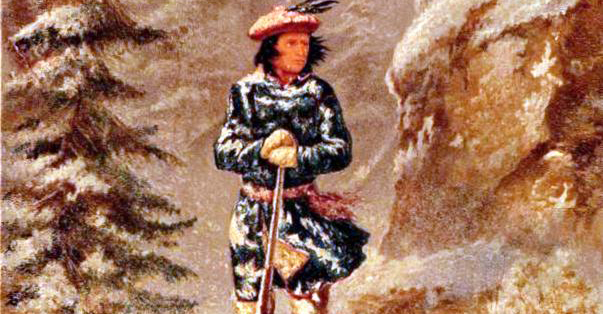
OLD LYCOMING – In 1780, three men ventured on a hunting party near the Susquehanna River and a run-in with the region’s renowned Iroquois Indians would change their lives forever.
The Iroquois Indians, who would ally themselves with the British during the American Revolution, were a prominent tribe in the region, in addition to the Lenape Tribe. The Iroquois were involved with the Big Runaway, which involved several settlers being massacred and fleeing to Fort Muncy.
As peace returned to the area in the following years, settlers began to venture back into the area. In the book “History of Lycoming County” by John Meginness, an article details a tragic incident between three locals and a group of Iroquois.
A hunting party
“Late in the fall of 1780, William King, Simon Cool, and James Sweeny came up from Northumberland to hunt deer,” the article reported. The three men, along with a hunting dog, canoed up the Susquehanna River and stopped near Lycoming Creek. As they traversed across the land, they found an abandoned cabin and settled there for the night. However, during the night, enough snow fell to cover the ground.
“They soon discovered Indian moccasin tracks,” the article said. “(But this) gave them no alarm.”
The three men traveled up towards what is now Old Lycoming Township.
“The next day they went up Dougherty’s run, intending to descend Bottle run to Lycoming creek,” it explained.
King knew the area because he had lived in the Jaysburg area some years before. According to Meginness, King was born in Scotland in 1745. He traveled to New Jersey to serve in the British Army during the Revolution. He resigned and “married Elizabeth Tharp” and both “moved to Northumberland County and settled on the site of Jaysburg, but were driven away by the Fair Play men on the ground of being intruders.”
Sweeny, sometimes called McSwiney or McSweeny was a “lieutenant in Colonel (Thomas) Hartley’s expedition” to hunt Indians. He was reported as being a “valuable officer.”
As for Cool, he served with Henry Antes in 1776 and as a captain in the Sixth Co. under Colonel William Plunkett.
Separated
As the three men and the canine continued their journey, “King, who was in the rear, heard Sweeny call Cool three times, and soon after he heard the report of a gun.”
He immediately searched the area for the two men, but was unable to find either man.
“Failing to find his companions he became alarmed and returned to the cabin, where he remained all night alone,” the article stated. The next day he waited, but neither Cool or Sweeny returned. He feared that his two companions had been either murdered or captured by Indians.
“Fearing to remain alone, he got aboard their canoe and paddled back to Northumberland and reported the strange circumstance,” Meginness reported.
As for Sweeny and Cool, it was explained that Sweeny “discovered, from his position on the hillside, three Indians stealthily following Cool. He called to him and warned him of what was behind, whereupon Cool ran for his life and (Sweeny) did the same.”
When they came to Bottle Run Creek, Sweeny leapt over it and landed on the other side. Cool, who was described as a “large man, fell short and landed in the water. When he clambered on the bank he found, on account of his wet clothes, that he could not run, and they took to trees.”
Cool, with his dog, and Sweeny prepared to make a stand. Even though the dog was “noted for hunting Indians,” it “barked furiously and tried to break away.” Cool stepped out of the trees to silence his dog, but “exposed his body, when an Indian shot him through the breast. Rising up he called to Sweeny that he was badly hurt, when he fell over dead.”
Captured
Sweeny realized that taking a stand would be futile and surrendered. He watched in horror as “Cool was killed (and) they scalped him.”
“The Indians stripped Cool, and taking his gun, threw an old one down in its place,” the writer said. Sweeny was escorted away and watched as Cool’s body was left “lying on the ground.”
The article went on to say that “after a long march, during which Sweeny suffered much from cold and wet, they reached Canada. There he remained until he obtained his release, and after much delay and suffering finally worked his way back to Northumberland.”
‘Risen from the dead’
Nothing had been heard about Sweeny or Cool for seven years and King continued with life. One night King was in a Northumberland tavern. He was standing in the doorway of a tavern, when Sweeny appeared.
“(It was) like one risen from the dead,” the writer said. “After a warm and friendly greeting, (Sweeny) related his experience, beginning with the day of his disappearance seven years before.”
Sweeny shared his story and King listened. It was said that both men and their families settled in Jaysburg. Later in life, Sweeny moved out west and King lived in Jaysburg “till his death, which occurred October 2, 1802.”




